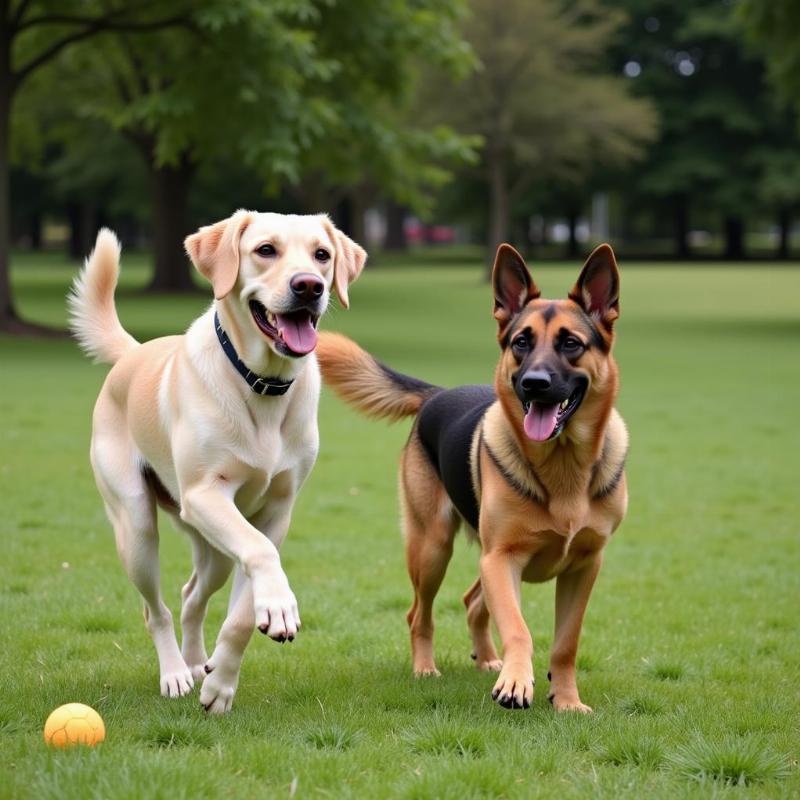The question of whether dogs can fall in love with another dog is a fascinating one that sparks debate among pet owners and animal behaviorists. While dogs may not experience romantic love in the same way humans do, they certainly form deep bonds and attachments with other dogs, often resembling the love we see between family members. These connections are built on shared experiences, mutual trust, and a sense of companionship. So, while the concept of “love” might be interpreted differently, the profound connections between dogs are undeniable.
Decoding Canine Affection: Is It Love or Something Else?
Dogs are social creatures, wired to form packs. This instinctual drive influences their interactions and relationships with other dogs. While we can’t ask a dog if it’s “in love,” observing their behavior reveals a complex interplay of factors influencing their bonds. These include shared playtime, mutual grooming, comfortable physical closeness, and even displays of protective behavior. These actions demonstrate a deep level of care and affection, even if it doesn’t perfectly align with our human definition of romantic love. They rely on each other for emotional support, comfort, and play.
Signs Your Dogs Are Bonded
How can you tell if your dogs are truly bonded? Look for these telltale signs:
- Shared Play: Do they engage in playful activities together, like chasing, wrestling, or tug-of-war?
- Mutual Grooming: Do they lick and groom each other, especially around the face and ears?
- Physical Closeness: Do they sleep close together, cuddle, or lean on each other?
- Protective Behavior: Does one dog defend the other if a perceived threat arises?
- Mirroring Behavior: Do they mimic each other’s actions, like yawning or stretching?
- Shared Comfort: Do they seek each other out during stressful situations, like thunderstorms or vet visits?
These behaviors, collectively, suggest a strong bond and a deep sense of connection between your dogs. While we may never fully understand the nuances of their emotional world, witnessing these interactions provides compelling evidence of the powerful attachments they form.
 Dogs Playing Together
Dogs Playing Together
Fostering Healthy Relationships Between Dogs
Introducing a new dog to your existing pet requires patience and careful management. Creating a positive environment where they can develop a healthy relationship is crucial. Start with slow, supervised introductions, allowing them to sniff each other from a safe distance. Gradually increase their interaction time as they become more comfortable. Providing separate spaces, toys, and feeding areas initially can also minimize competition and potential conflict. Positive reinforcement through treats and praise when they display friendly behavior can further encourage bonding.
Can a Dog’s Bond With Another Dog Replace Human Love?
While dogs can form profound bonds with each other, these relationships don’t replace the unique bond they share with their human companions. Dogs still rely on us for their basic needs, including food, shelter, and veterinary care. They also thrive on the love, attention, and emotional connection we provide. The human-dog bond remains a special and irreplaceable one, offering a different kind of love and support than what they experience with other dogs.
Conclusion
So, can dogs fall in love with another dog? While we can’t definitively say they experience romantic love, the deep bonds, affection, and companionship they share are undeniable. These relationships enrich their lives, providing emotional support, comfort, and a sense of belonging. Understanding these complex canine connections allows us to better appreciate the social nature of dogs and nurture the loving relationships within our multi-dog households.
FAQ
- How do I know if my dogs are fighting or playing? Playful interactions typically involve relaxed body language, loose movements, and play bows. Fighting, on the other hand, is characterized by tense postures, aggressive vocalizations, and bites intended to cause harm.
- Is it normal for bonded dogs to grieve when one passes away? Yes, dogs can experience grief and exhibit changes in behavior, such as loss of appetite, decreased activity, and vocalizations.
- What should I do if my dogs don’t get along? Consult with a certified dog trainer or veterinary behaviorist for guidance on managing their relationship and addressing any underlying behavioral issues.
- Can dogs of different breeds or sizes bond? Absolutely! Breed and size are not barriers to forming strong bonds between dogs.
- How can I encourage my dogs to bond? Provide opportunities for shared activities like walks, playtime, and training sessions. Positive reinforcement and patience are key.
- Do dogs get jealous of each other? Dogs can exhibit behaviors that resemble jealousy, often stemming from competition for resources or attention.
- Will introducing a new dog change the dynamic between my existing dogs? Yes, introducing a new dog will inevitably shift the dynamics within your household. Be prepared for an adjustment period and manage their interactions carefully.
Related Articles on Beautdogs.us
About Beautdogs.us
Beautdogs.us is your trusted source for comprehensive dog care information, breed-specific insights, and top-quality product recommendations. We cater to both seasoned dog owners and those new to the world of canine companionship, offering expert advice on everything from nutrition and training to health and wellness. Our mission is to empower you to provide the best possible care for your beloved furry friend. For expert advice and personalized recommendations, contact us at [email protected] or call us at +1 501-555-7529. Let Beautdogs.us be your guide to a happier, healthier life for your dog!